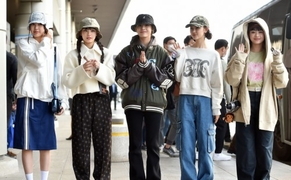 |
| Medical workers wearing personal protective equipment transfer patients arrived at the Seoul Medical Center in Seoul on Dec. 14, 2021./ Source: Yonhap |
AsiaToday reporter Park Ah-ram
South Korea’s new coronavirus cases continue to hover around 5,000 to 7,000, putting strain on the country’s already overwhelmed health care system. The government is expected to announce special antivirus measures as early as Friday to curb the spread of the virus. Attention is now on whether the special measures will include further caps on private gatherings and stricter social distancing measures.
The Korea Disease Control and Prevention Agency (KDCA) reported 5,567 new COVID-19 cases Tuesday from the previous 24 hours, pushing the total caseload to 528,652. The figure decreased by 250 from the same time Monday, but the decline was attributable to fewer tests over the weekend.
The number of critically ill patients rose to a record high 906, surpassing 900 for the first time.
Ninety-four more people died of the virus, raising the total death toll to 4,387. Daily deaths jumped to a fresh high.
Hospital beds for COVID-19 patients are quickly running out. According to health authorities, 1,055 out of 1,288 beds designated for COVID-19 treatment were already occupied as of Monday, with an operating rate of 81.8 percent nationwide and 86.2 percent in greater Seoul area.
In response, three academic associations in the field of infection, including the Korean Society of Infectious Diseases, the Korean Society for Antimicrobial Therapy, and the Korean Society for Healthcare-associated Infection Control and Prevention called for the reintroduction of social distancing rules due to the country’s strained health care system.
They issued a statement Monday, saying, “The COVID-19 virus is spreading rapidly, and the number of critically ill patients is increasing rapidly. We are realizing the limitations of the medical response system. As professional academic organizations, we are deeply concerned of serious human casualties in the near future unless powerful measures are implemented appropriately.”
“This is the right time to stop to secure the response capacity of the country’s health care system. Through an emergency stop, we need to take meaningful measures to curb the spread of the virus and reduce the number of confirmed cases and critically ill patients for the safety of the people. The government needs to implement stricter social distancing rules temporarily and actively compensate small business owners and the self-employed hit by the rules,” the statement said.
The risk level of the pandemic in the country’s capital region over the past week has been at the highest level for four weeks in a row, health authorities said. Earlier, the country introduced a five-tier assessment system to evaluate the risk level of COVID-19 on a weekly basis that is used to decide whether to further ease virus restrictions under its three-phase “living with COVID-19” scheme.
If the risk level reaches the fourth degree or higher, the government is supposed to carry out emergency measures. However, the government has been under fire for being cautious on implementing stricter social distancing rules.
In response, Park Hyang, a senior Health Ministry official, said the government did not implement stricter operating-hour restrictions at restaurants and bars because it considered the people’s livelihood and the country’s economy.
#health care system #COVID-19 #restriction
Copyright by Asiatoday
Most Read
-
1
-
2
-
3
-
4
-
5
-
6
-
7





















